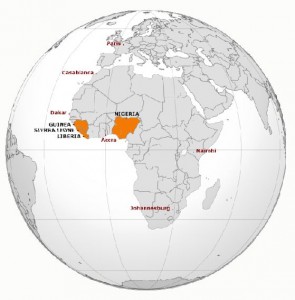Since the index case in Mali of a young girl who traveled from Guinea and subsequently died of Ebola, a nurse has since succumbed to the virus. Separately, another male who travelled from Guinea, has died and diagnosed as an Ebola victim, together with the nurse who treated him.
A doctor from one of the main private clinic in Bamako, is as well infected. Several dozen responders and other contacts are under quarantine and are being monitored for signs of illness. In parallel, some fever controls have been put in place on the departure of Bamako airport.
An American doctor working in Sierra Leone has also been infected by the virus and should be transferred shortly to the US.
Canada and Mauritius have decided to close their borders to travelers coming from Ebola infected countries; this measure applies even for their own citizens.
In Niger, despite none Ebola case, local authorities have developed an awareness program in schools to inform populations about Ebola risks.
A Luxemburg satellite operator SES has also launched a free TV channel “Fight Ebola” to disseminate information on Ebola, to reach 20 million people in the region.
Despite a reach of over 5000 Ebola victims, MSF has reported a drop in Ebola patients occupying hospital beds in Liberia and it is postulated this is an indicator of a downward trend in numbers of Ebola cases. As a result, the country’s president, Dr. Ellen Sirleaf Johnson, announced the lifting of the state of emergency, permitting the re- opening of public markets and other activities.
Nevertheless, the nation’s medical infrastructure remains devastated and our travel recommendations remain unchanged. It is also strongly believed that the number of cases of Ebola is substantially underreported, especially in Sierra Leone. This may partly explain any apparent dip in case reports and it is considered premature to interpret this as a definite trend.
Recent experience again reconfirms the complete lack of medical resources in the countries of Sierra Leone, Guinea and Liberia available to treat foreigners with even minor illnesses. It should be expected that should travelers, expatriates or relief workers require medical care, they will have to be self-reliant and remain in private quarters until transportation out of the country can be arranged.
Limitations is available transportation, screening and exit restrictions may delay movement of patients in need of a formal medical care.
You will find on the following pages an information update about the evolution of the epidemic
Dr. Cai Glushak
International Chief Medical Officer

